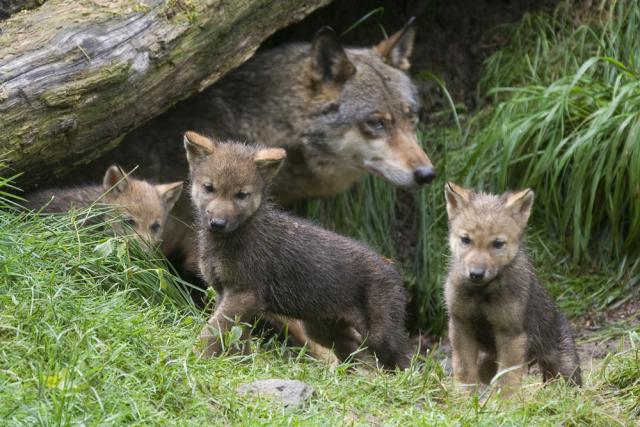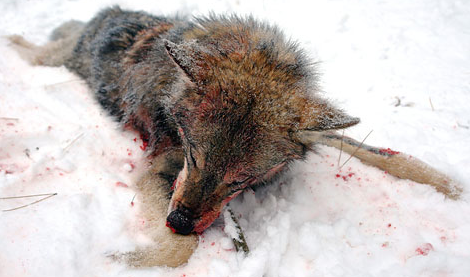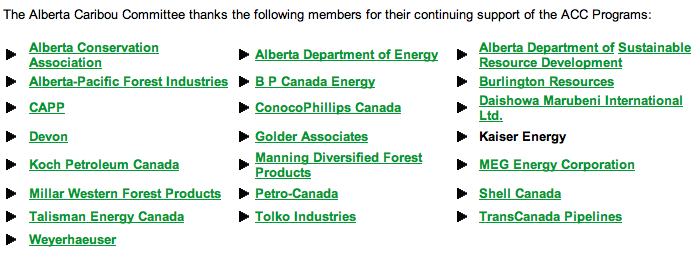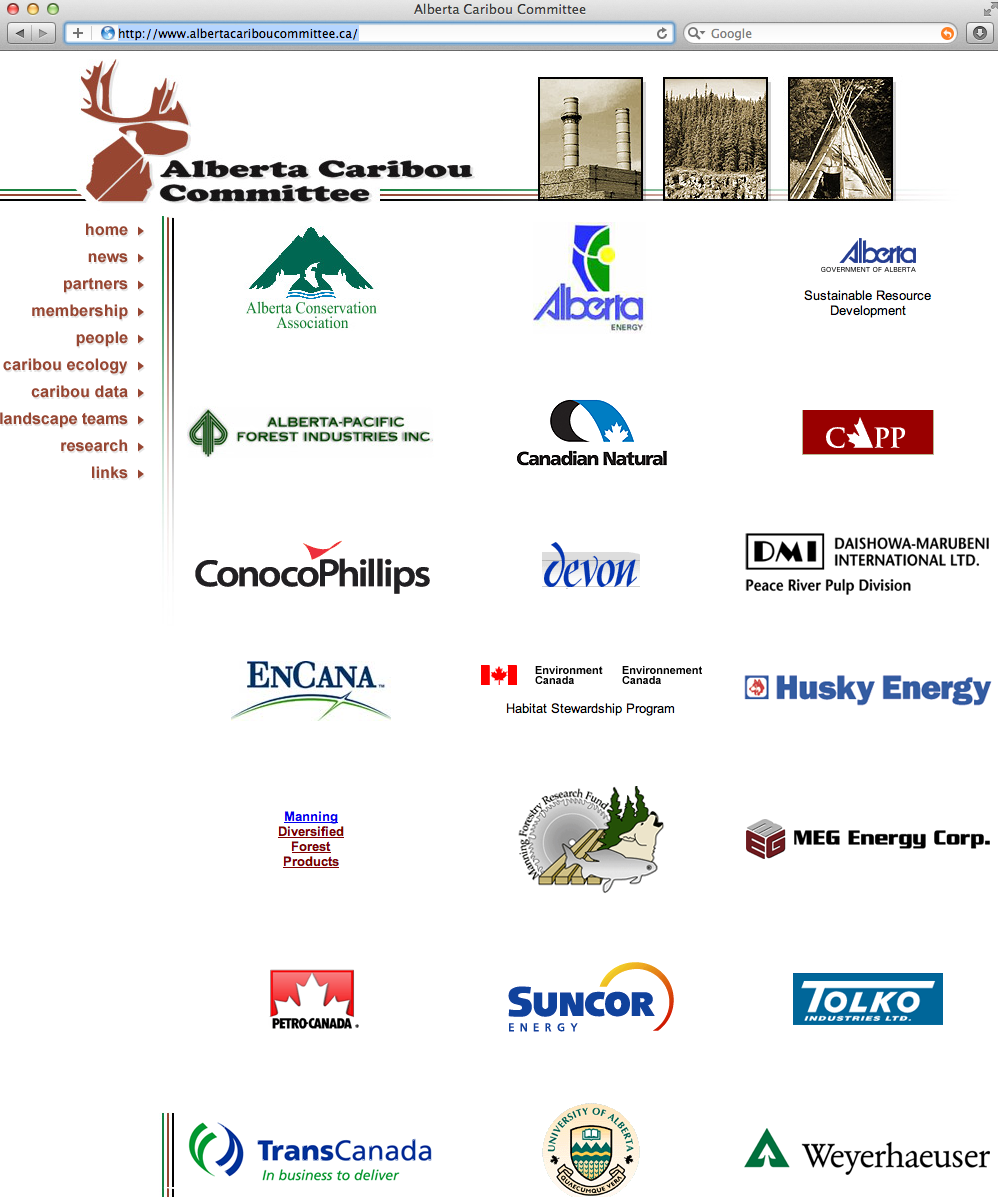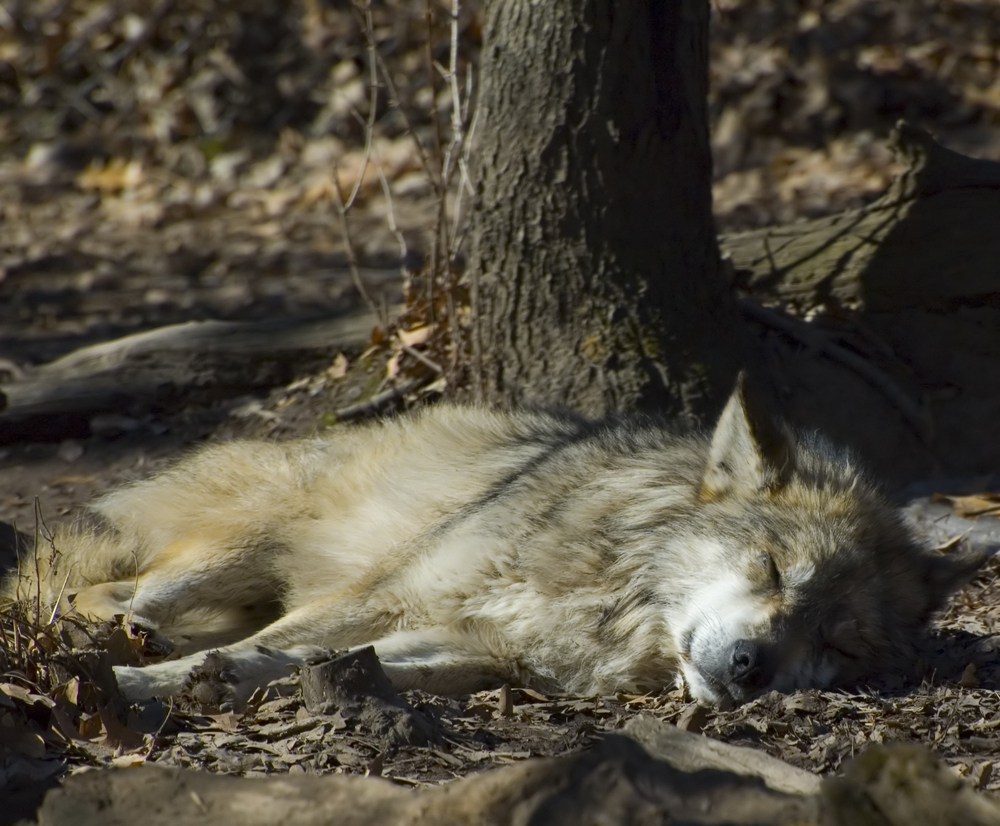In the latest and perhaps most astonishing display of the tar sands industry’s attacks on science and our democracy, the government of Alberta has made plans to initiate a large-scale wolf slaughter to provide cover for the destruction wrought by the industrialization of the boreal forest ecosystem.
In the coming years, an anticipated 6,000 wolves will be gunned down from helicopters above, or killed by poison strychnine bait planted deep in the forest. Biologists and other experts say the cull is misguided, and that their studies have been ignored or suppressed. Worse, they warn that although the government is framing the wolf cull as a temporary measure, it has no foreseeable end.
The Alberta government has already initiated the wolf cull in regions of Alberta heavily affected by industrial development. In the Little Smoky region, an area heavily affected by the forestry, oil and gas industries and just a few hundred kilometeres away from the tar sands region, a broad wolf cull has already begun, claiming the lives of more than 500 wolves.
Recently the Alberta government proposed a plan to open this brutal form of ‘wildlife management’ to other regions, suggesting an extensive and costly cull in place of more responsible industrial development.
This is clear evidence of the fact that Alberta’s tar sands oil is unquestionably conflict oil, despite the propaganda spouted by the “ethical oil” deception campaign. Aside from its disruptive affects on wildlife, tar sands oil is dirty, carbon intensive and energy inefficient from cradle to grave.
And that’s without mentioning the role the tar sands boom has played in Canada’s slide from climate leader to key villain on the international stage. Beyond its environmental consequences, tar sands extraction has negatively affected local tourism and recreation-based economies, impacted public health and torn at the rich fabric of cultural diversity and pride among Albertans and all Canadians.
Behind the Harper administration’s unbounded drive to drown Canada’s reputation in tar sands oil pollution lies the political corruption characteristic of the classic petro-state. Free speech is being oppressed, while respected members of the scientific community claim they are being muzzled, ignored and intimidated.
Conservation and environmental groups are being falsely attacked as ‘radical ideologues’ and ‘saboteurs’. Neighbors are pitted against each other while important decisions about the future prosperity of all Canadians are rigged to favor the interests of multinational oil companies and foreign investors.
The wolf cull is ostensibly designed to protect northern Alberta’s woodland caribou, a species that in recent years has become critically threatened. But scientists have ridiculed the plan, saying this sort of ‘wildlife management’ turns the wolf into an innocent scapegoat, while the real culprit – the province’s aggressive timber, oil and gas development – is spared any real scrutiny or accountability.
According to this strategy, caribou and wolf alike fall prey to another kind of predator: multinational corporations.
The National Wildlife Federation launched a campaign against the wolf cull last week, noting that the Keystone XL pipeline, if eventually built, “would amount to an American seal of approval for the strychnine-poisoning of Alberta’s wolves.“
At the risk of potentially permanent impacts on important Alberta wildlife species, extractive industries are spearheading an unscientific effort to further tamper with nature, targeting Alberta’s wolves for declining woodland caribou health. In reality, scientists have demonstrated that habitat destruction and industrialization are the real threats to the caribou and the entire ecosystem. This classic case of misguided ‘wildlife management’ is meant to obscure irresponsible industrial development, not to protect iconic Canadian wild species.
Stop Unethical Oil in its Tracks. Sign DeSmogBlog’s email petition calling on Environment Canada to reject this anti-science attack on wolves. Let’s hold industry accountable for damaging the boreal forest ecosystem, not scapegoat innocent wolves.
Sadly, Alberta’s history of covering over regrettable and irresponsible wildlife management runs about as far back as its history of industrial development – a correlation all too evident in the recent caribou recovery charade.
The Caribou ‘Recovery’ Backstory
Caribou numbers have been in decline in the province since the early 1960s, although knowledge of their diminishment dates back to the 1920s. But it took until 2001 – after nearly two decades of prodding by the province’s scientists – for the Alberta government’s Endangered Species Conservation Committee (ESCC) to designate the woodland caribou a ‘threatened species.’ The designation, long avoided by the government, invokes a host of legal obligations, most notably, to the province’s Wildlife Act and the federal Species at Risk Act (SARA).
Despite its name, the ESCC amounts to little more than an industrial development club, and it is directly responsible for delays in critical caribou protections. The ESCC is an initiative of the Government of Alberta’s Ministry of Sustainable Resource Development (SRD), and has a short list of extractive industrial members including the Canadian Association of Petroleum Producers, two representatives from Alberta Forest Products Association, Alberta Fish and Game Association, Alberta Irrigation Projects Association and the Western Stock Growers’ Association.
The ESCC currently refuses to demote caribou to a critically endangered status despite encouragement from leading scientists, and accusations that it is stalling critical protections intended by the Wildlife Act. The Alberta Wilderness Association, one of the key environmental bodies fighting to preserve Alberta’s caribou and halt the needless killing of wolves, has accused the ESCC of protecting industry interests, citing this as the cause behind the ESCC’s continuous failure to act.
After the ESCC hesitantly listed the caribou species as threatened (a less formidable title than endangered), the Alberta Woodland Caribou Recovery Team was formed. By 2004 the team had developed a thorough working plan to recover caribou populations, making recommendations that covered all sides of the caribou issue, from protecting habitat to minimizing human activity. And each of the team’s recommendations were adopted – but with one surprising exception.
The Alberta government refused to consent to a key recommendation for “a moratorium of resource development allocations in the range areas of caribou populations at immediate risk of extirpation.” This recommendation isn’t asking a lot: just the halt of mineral and timber allocations in specific regions where the caribou were facing complete desolation. But Alberta’s leaders refused to tolerate any setbacks to forestry or oil and gas development.
Industry Takeover
The recovery team was unceremoniously disbanded the following year. The dismissal of the team – and its recommendations – while at odds with the intended purpose of the recovery plan, might best be explained by the presence of some powerful industry voices at the strategy table: Alberta Energy and the Canadian Association of Petroleum Producers (CAPP), Canada’s largest contingent of petroleum lobbyists. Representing CAPP’s interests on the recovery team were Devon Resources and Talisman Energy.
But nothing explains that twist in the story better than Alberta’s staunch fidelity to continued industrial development. And nothing stands to threaten that blind committment more than a band of respected scientists officially recommending a moratorium on certain activities.
Since 2004, Alberta has made no progress on the issue – the tar sands expansion continues with reckless speed while caribou populations continue to decline.
Alberta’s refusal to consider limiting tar sands expansion – even where caribou herds are facing imminent extirpation (localized extinction) – has led to a wholly unscientific alternative: a concerted effort to shift blame onto the wolves.
In the wake of the recovery team’s dispersal, the Alberta government launched a new official ‘multi-stakeholder’ body tasked with overseeing the province’s Caribou Recovery Strategy: the Alberta Caribou Committee. Then Minister of Sustainable Resource Development, pro-hunt David Coutts, formed the ACC to take over the responsibilities of the Recovery Team.
Science Under Attack
The Alberta Caribou Committee (ACC) describes itself as a “community of Government, Industrial, and Academic partners” working to “integrate industrial activities in northern Alberta with the conservation of caribou and caribou habitat.”
This proposed ‘integration’ of conservation and industrial activities, however, means that independent scientific research is directed by heavy-handed industrial interests and a political agenda.
Internationally renowned biologist Paul Paquet describes the shared interest of industry and government in Alberta as a threat to scientific integrity.
“There’s a real lack of independence there and there isn’t even independence of most of the government scientists. Most are in a position where they have to represent a provincial concern rather than a scientific one or they’re compromised in some other way,” Paquet told DeSmogBlog. “Its unfortunate.”
Scientist have found themselves fighting for caribou preservation in an impossible set of circumstances, where industry refuses to slow the pace of timber and tar sands development, and the government facilitates this growth in any way possible.
But perhaps that has something to do with the composition of the ACC.
Who Calls the Shots?
The Alberta Caribou Committee is so heavily dominated by timber, oil and gas interests, their public list of members reads like an industry convention brochure:
Take a look at the Alberta Caribou Committee’s website list of sponsoring ‘partners’:
Notice an overwhelming number of oil and gas and forestry interests entrusted with this ‘wildlife recovery’ effort?
The list of ‘partner’ funders of this organization includes, among funding members: EnCana, Canadian Natural, Suncor, and Husky Energy. Energy companies interested in becoming a ‘contributing partner’ are directed to contact a representative from TransCanada Pipelines.
Recommendations made by the ACC are done so under the direction of a governance board, also stacked in favor of industry and government interests. The board reports to the Minister of SRD, Frank Oberle. From 1988 until 2004, Oberle worked as a management forester and senior forestry advisor for Daishowa-Marubeni International Ltd., one of the industry members of the ACC. Currently Oberle is an MLA from the Peace River region of Alberta – a constituency heavily involved with the tar sands industry, with a bad caribou track record.
With such close steps between industry and the caribou recovery strategy, it’s as if industry interests are both calling the shots and pulling the trigger.
This wolf cull seems designed as a concerted effort – at the provincial and federal level – to conceal the cumulative social and environmental impacts of rapid tar sands expansion, keeping the decision-making power in the hands of a small group of industry and government representatives with an embedded industrial agenda.
It appears the government and industry are willing to export Canada’s natural resources at whatever cost to our society – and it looks like wolves and caribou just got added to that list of expenses.
The question is, are we willing to pay the steep price of our health and heritage to supply polluting fuels to other countries who don’t always share our principles of democracy?
The public comment period surrounding the proposed caribou recovery plan is set to close February 22nd.
Stop Unethical Oil in its Tracks. Sign DeSmogBlog’s email petition calling on Environment Canada to reject this anti-science attack on wolves. Let’s hold industry accountable for damaging the boreal forest ecosystem, not scapegoat innocent wildlife.
Part 1 in a series on Unethical Oil, please bookmark and follow DeSmogBlog for more.
Image Credits: Shutterstock | Irina Afonskaya | Intraclique LLC | Neven Bjelić | Kris Krüg
Subscribe to our newsletter
Stay up to date with DeSmog news and alerts


